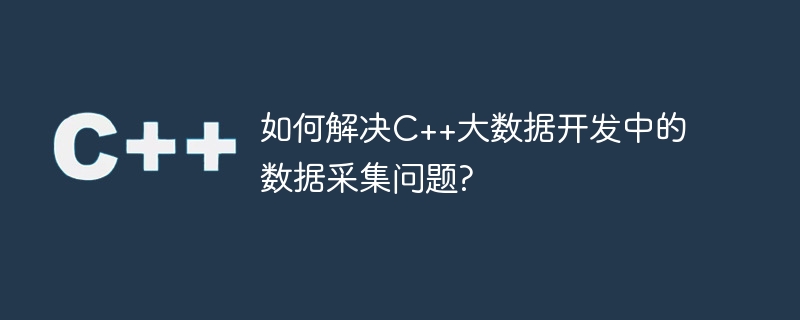Home >Backend Development >C++ >How to solve the data collection problem in C++ big data development?
How to solve the data collection problem in C++ big data development?
- WBOYWBOYWBOYWBOYWBOYWBOYWBOYWBOYWBOYWBOYWBOYWBOYWBOriginal
- 2023-08-25 22:25:061540browse

How to solve the data collection problem in C big data development?
Overview:
In C big data development, data collection is a crucial link. Data collection involves collecting data from various data sources and collating, storing and processing it. This article will introduce several methods to solve data collection problems in C big data development and provide code examples.
1. Using the C standard library
The C standard library provides some basic file reading and writing functions, which can be used to collect data in local files. The following is a simple sample code that demonstrates how to use the C standard library to read data from a CSV file:
#include <iostream>
#include <fstream>
#include <sstream>
#include <vector>
struct DataPoint {
std::string label;
std::vector<double> features;
};
std::vector<DataPoint> readCSV(const std::string& filename) {
std::vector<DataPoint> data;
std::ifstream file(filename);
std::string line;
while (std::getline(file, line)) {
std::istringstream iss(line);
std::string label;
std::string featureStr;
std::vector<double> features;
std::getline(iss, label, ',');
while (std::getline(iss, featureStr, ',')) {
features.push_back(std::stod(featureStr));
}
data.push_back({label, features});
}
return data;
}
int main() {
std::vector<DataPoint> data = readCSV("data.csv");
// 对数据进行处理
for (const auto& point : data) {
std::cout << "Label: " << point.label << ", Features: ";
for (const auto& feature : point.features) {
std::cout << feature << " ";
}
std::cout << std::endl;
}
return 0;
}The above code reads a CSV file named data.csv , and stores the data as a vector of DataPoint structures. Each DataPoint structure consists of a label and a series of characteristics. We can add more processing processes to the data as needed.
2. Use third-party libraries
In C big data development, we can use some powerful third-party libraries to solve data collection problems, such as Boost, Poco, etc. The following is a sample code that uses the Boost library for HTTP data collection:
#include <iostream>
#include <boost/asio.hpp>
#include <boost/asio/streambuf.hpp>
#include <boost/asio/read_until.hpp>
std::string fetchDataFromURL(const std::string& url) {
boost::asio::io_service ioService;
boost::asio::ip::tcp::resolver resolver(ioService);
boost::asio::ip::tcp::resolver::query query(url, "http");
boost::asio::ip::tcp::resolver::iterator endpointIterator = resolver.resolve(query);
boost::asio::ip::tcp::socket socket(ioService);
boost::asio::connect(socket, endpointIterator);
boost::asio::streambuf request;
std::ostream requestStream(&request);
requestStream << "GET / HTTP/1.0
";
requestStream << "Host: " << url << "
";
requestStream << "Accept: */*
";
requestStream << "Connection: close
";
boost::asio::write(socket, request);
boost::asio::streambuf response;
boost::asio::read_until(socket, response, "
");
std::istream responseStream(&response);
std::string httpVersion;
responseStream >> httpVersion;
unsigned int statusCode;
responseStream >> statusCode;
std::string statusMessage;
std::getline(responseStream, statusMessage);
std::ostringstream oss;
if (response.size() > 0) {
oss << &response;
}
while (boost::asio::read(socket, response,
boost::asio::transfer_at_least(1), error)) {
oss << &response;
}
return oss.str();
}
int main() {
std::string url = "www.example.com";
std::string data = fetchDataFromURL(url);
std::cout << data << std::endl;
return 0;
}The above code uses the Boost library to perform an HTTP GET request and stores the response data as a string.
3. Use parallel processing
In C big data development, data collection often requires processing a large amount of data. In order to speed up data collection, parallel processing technology can be used. The following is a sample code that uses the OpenMP library for parallel processing:
#include <iostream>
#include <vector>
#include <omp.h>
std::vector<int> fetchData(const std::vector<int>& ids) {
std::vector<int> data(ids.size());
#pragma omp parallel for
for (int i = 0; i < ids.size(); ++i) {
int id = ids[i];
// 采集数据
data[i] = fetchDataByID(id);
}
return data;
}
int main() {
std::vector<int> ids = {1, 2, 3, 4, 5, 6, 7, 8, 9, 10};
std::vector<int> data = fetchData(ids);
// 处理数据
for (const auto& d : data) {
std::cout << d << " ";
}
std::cout << std::endl;
return 0;
} The above code uses the OpenMP library for data acquisition and parallel processing of the elements in the ids vector.
To sum up, this article introduces how to solve the data collection problems in C big data development through C standard library, third-party library, parallel processing and other methods, and provides corresponding sample code. These methods can help developers collect data efficiently and provide a basis for subsequent data processing and analysis. However, in actual applications, developers still need to choose an appropriate method based on specific business needs and data scale. I hope this article can help readers with data collection issues in C big data development.
The above is the detailed content of How to solve the data collection problem in C++ big data development?. For more information, please follow other related articles on the PHP Chinese website!
Related articles
See more- What is the difference between C language and C++
- How to create a new c language file in vc++6.0
- How to improve data filtering efficiency in C++ big data development?
- How to deal with data pipeline issues in C++ big data development?
- How to improve the data recommendation effect in C++ big data development?

